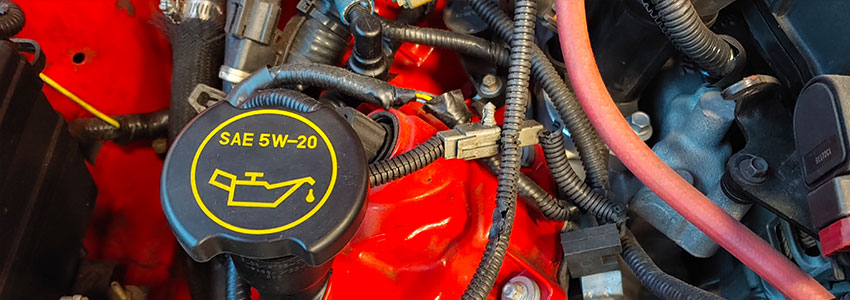Engine oil is the unsung hero of the automotive world; it sits inside your Mustang's engine quietly doing
its job of lubricating hundreds of parts without any cries for attention. So take a moment to think
about what goes on inside the engine. From the first movement of a piston to a crankshaft rotating at
thousands of RPMs, it's a complex operation that wouldn't be possible without engine oil. Regardless if you've got the original pushrod
5.0,
the latest OHC 5.0, or another powerplant under the
hood, keeping the ponies running smoothly is essential. The good news is that an oil change is one of
the most affordable yet important car maintenance tasks for your car. In addition, even if you're not an
avid wrencher, an oil change is an easy DIY project. With this in mind, let's explore what's involved
with a Mustang oil change. Also, be sure to check out the chart at the end for info about your Mustang.
What Does Oil Do?
Why Is Oil So Important?
What Is Oil Viscosity?
How Does An Oil Filter Work?
Why Change Your Oil?
Synthetic vs Conventional
How Often To Change Oil?
How Much Does It Cost?
Oil Change Guide
Which Oil & Filter For My Mustang?
Let's expand on the importance of motor oil, the true lifeblood of your Mustang. No substance has a
greater effect on an engine's longevity than oil. High-quality oil combined with a proper maintenance
schedule helps maintain the engine's health, while improper lubrication can lead to a powerplant
disaster. The most important job for motor oil is maintaining lubrication among the internal metal engine parts
that move against each other. The idea here is to reduce wear and tear on these components. Remove
proper lubrication from these seemingly durable parts, and the engine will literally grind to a halt
(and a costly halt at that). Engine lubrication serves other functions as well. First, to help with cooling. During engine operation,
particularly during top-end use, motor oil absorbs excess heat and cools down internal parts. Second,
the more smoothly an engine can run, the more fuel-efficient and environmentally friendly it is. And, lastly, oil reduces the build-up of damaging substances formed inside the engine during the
combustion process. This action reduces engine wear. Oil is single-handedly the lifeblood of the automotive industry and engine performance; without it, there
wouldn't be any form of the racing, enthusiast community, or passion for the incredible engineering
marvel that is the Ford Mustang. Throughout Mustang history, there have been many legendary Ford
engines, which have empowered enthusiasts from all walks of life to get the most out of their iconic
pony car. To accomplish this, chemical engineers have put the most valiant effort in creating synthetic
oil solutions to help every Mustang and enthusiast create monstrous amounts of power while properly
lubricating vital internal engine components. An engine is essentially a giant air compressor; simultaneously, it sucks in air, and fuel is injected
into the combustion chamber. A massive explosion happens throughout all eight cylinders to transmit
power through the drivetrain. Your Mustang motor creates a lot of heat and friction; as the rotating
assembly moves up and down in the engine block. Oil is the substance that ensures everything stays at
optimal temperature levels; while providing thorough lubrication, and oil pressure are consistent
throughout the RPM band. Though engine oil is widely abundant, all engine oil is not created equal. It
is
why you must choose wisely for your motor, to maintain proper engine functionality and to keep oil
sludge at bay. One of the first things enthusiasts must ask themselves is, “what kind of driving or racing will I do in
my Mustang?” Once this question is answered, you can decide what type of engine oil you will need for
your Mustang. Nowadays, it is a pretty standard practice to have synthetic oil no matter what
modifications
are done to your pony's engine. Remember, various oil types are not equal, and some are positioned for
specific applications. So you must pick a synthetic oil that will hold up to a certain amount of heat,
wear, viscosity, and additives to enable proper lubrication of your pistons, connecting rods, piston
rings, and crankshaft. It will ensure that your Mustang
engine will hold up to the extreme forces
exerted when you're going full send on the track or street. Motor oil viscosity refers to how easily oil flows at a specific temperature. In simple terms, this means
its thickness. For example, how water compares to pancake syrup. Thinner oil has a lower viscosity and
flows more readily at colder temperatures than a thicker, higher viscosity oil. Ideally, you want to use an oil that balances out cold weather needs with improved performance during
extreme conditions. For example, a thin oil reduces engine friction and aids in engine startup during
cold weather. On the other hand, thicker oil better maintains continuous lubrication during higher
temperatures and top-end use. The viscosity scale was created by the Society of Automotive Engineers (SAE) to grade motor and
transmission oils. Using the XW-XX label, the first number (before the W) grades how the oil flows at
zero degrees Fahrenheit. The lower the number, the easier the oil flows in winter temperature. The
number after the W specifies the oil's viscosity at 100 degrees Celsius and its resistance to
high-temperature thinning. For example, at cold temperatures, a 5W-30 grade oil thickens less than a 10W-30 grade oil. While at hot
temperatures, the 5W-30 grade oil becomes thinner before a 5W-40 grade oil. Your Mustang has many filters to keep contaminants out of vital areas, including your oil, fuel, and air
intake. All of these require proper filtration to filter out harmful deposits, which could hurt your
motor. Like you, your blood is vital to correct performance and health, and the ability to have an
adequate amount is critical. An oil filter is like your kidneys; it is the component that filters out
all of the bad bacteria and harmful contaminants that enter your body. The same thing goes for your
stallion's engine; it needs pure and clean oil to help your engine cool and maintain seals between
piston
ring gaps and cylinder walls while absorbing contaminants. Oil filters are exceedingly essential to keep
engine oil as clean as possible throughout the life of your engine. If your Mustang engine didn't have an oil filter, it wouldn't be able to separate harmful deposits in
your oil, which could affect how your engine performs, especially at higher RPMs. Over time, your motor
in your pony can build up deposits such as sludge and soot that, if not properly maintained and cared
for, could trigger engine detonation, which could ultimately result in your powertrain breaking down. So
the way to ensure this doesn't happen is by installing a high-performance oil filter.
It will cycle engine oil through while your engine runs to provide maximum oil pressure, filter out
contaminants, and promote better lubrication throughout all vital internal engine components. As your engine is running, your oil pump is responsible for proper oil circulation. At the same time,
your motor runs to circulate oil throughout the block, cylinders, and pistons to promote performance.
Like all fluid, gravity forces oil downwards into the engine; this is where the oil pickup comes into
play. While your Mustang engine circulates its oil, it will move through the oil filter to filtrate out
harmful contaminants your engine can see during a drive cycle. However, your air filter is designed to
get out as much polluted air as possible; particles can still enter your engine during a drive cycle. So
your oil filter is responsible for completely filtering out the remaining contaminants throughout your
engine; oil will pass through one side of the filter and then reach the other side completely clean to
move through all eight cylinders. Ensure you choose a filter built to withstand high pressure and has the proper filtration system built
within so that you will have reassurance it will perform when it counts most! As a result of engine use, oil type, and outside factors such as extreme temperatures, Mustang engine oil
eventually breaks down. Unfortunately, this means that the oil can develop sludge deposits that reduce
lubrication inside the engine and cause an increase in engine wear. At best, a delayed oil change makes
the engine work a little harder. At worst, you're looking at an engine teardown and a hefty repair bill.
Look at back the first few generations of Mustangs and their engines, simpler overhead valve designs and
modest output (by today's standards) meant less taxing requirements for motor oil. Fast forward a few
decades to modern Mustangs with multi-valve overhead cam engines that couldn't exist without advanced
lubrication technology. From today's EcoBoost Mustang and the Mustang Shelby GT500, these cars couldn't
function for very long without clean, sludge-free motor oil. Finally, there's another practical reason for replacing engine oil. This maintenance task is a
requirement of new car and aftermarket warranties. Fail to follow the recommended maintenance schedule,
and a warranty claim could be denied. As mentioned earlier, today's motor oils developed in response to the advanced lubrication requirements
of modern engines. There's only so much chemical engineers could do with a conventional motor oil solely
derived from petroleum. And while synthetic motor oil has a petroleum base, it uses man-made compounds
that aren't found in nature. These artificial ingredients can be engineered for maximum lubrication and
longevity. So, synthetic oils: In contrast, conventional oils are prone to: As a general guideline, change your Mustang's oil and oil filter every 5,000 miles. If you're using
conventional oil and do a lot of stop-and-go driving, then you might want to change the oil sooner. At
the same time, if you use synthetic motor oil, then an oil change might not be necessary for 7,500 miles
or more. Three factors affect the timetable for an oil and filter change. The price for an oil and filter change will vary greatly depending on your Mustang, the type of oil used,
and who does the work. At a repair shop or quick lube place, you're likely to pay $40 or so for an older
Mustang that only needs five quarts of conventional oil. For a newer Mustang GT that needs ten quarts of
synthetic oil, expect to pay about $150. Of course, a dealer will charge more. If you're inclined to change the oil on your own, then five quarts of oil will run $20-$50 (depending on
the oil type), and the filter will cost $10-$20. Of course, you'll also need a way to safely jack up the
car, an oil filter wrench, an oil drain pan, and a few other basic tools. Use this chart to identify your Mustang and its engine oil requirements quickly. Also, it is always a
good idea to verify this information by reviewing the owner's manual. Year / Engine -- Mustang Oil Change: Identify your Mustang's model year and what's under
the hood. Mustang Oil Type: Determine the required oil viscosity needed for your Mustang. Be sure
to check the owner's manual for additional requirements for abnormal use, like during track days or in
extreme weather conditions. Mustang Oil Capacity: Check the quantity of oil (in quarts) required for your Mustang.
Mustang Oil Filter: Identify the correct Ford (Motorcraft) oil filter to use for your
Mustang. If choosing an aftermarket oil filter, ensure the component is compatible with your car's year,
engine, oil type, and operating conditions. ^above 32? / *below 32?
As stated, oil is the lifeblood of every Mustang on the road and track; it gives every enthusiast the
ability to go full send on demand. Choosing the right oil is crucial to enabling all-out performance,
horsepower, and torque from your pony's engine. So you will have to ask yourself, what are you going to
use your stallion for, and how you plan to drive it? Over the last decade,
companies like Royal Purple, Pennzoil,
and Valvoline have pushed the edge in engine oil technology to
aid racers and enthusiasts alike to give their Mustang boundless performance and reliability to every
vital engine component. We highly recommend choosing a synthetic oil over a synthetic blend or non-synthetic oil because of the
tolerances and additives built within. It will add to your engine's durability, driveability and help
produce more power and fewer deposits from lousy fuel or air intake contaminants. Also, choose your oil
based on your engine's application, whether you have forced induction or a naturally aspirated engine.
Do not squander and be negligent to your pony's heart and give the blood that it deserves to output
nothing but brute American muscle! Source: MustangSpecs, Ford, Mobil, TotalEnergiesMustang Oil Change Guide: Oil Type & Capacity


What Does Engine Oil Do?
Why Is Oil So Important To Your Mustang?

What Is Oil Viscosity?

How Does An Oil Filter Work?

Why Does Mustang Engine Oil Need To Be Replaced?
Synthetic vs Conventional Oil For A Mustang?

How Often Should I Change The Oil In My Mustang?

How Much Is A Mustang Oil Change?

Mustang Oil Change Guide: At A Glance
Mustang Oil Change Type & Capacity By Year/Engine
Year / Engine
Mustang Oil Type
Mustang Oil Capacity
Mustang Oil Filter
1979-1993 Mustang
5.0L V8 / 3.8L V6 / 2.3L I4 (non-turbo)
10W-30^ / 5W-30*
5.0 Quarts
FL300
2.3L I4 Turbo
10W-30^ / 5W-30*
5.5 Quarts
FL300
1994-1998 Mustang
5.0L V8
5W-30
5.0 Quarts
FL1A
3.8L V6
5W-30
5.0 Quarts
FL400
4.6L V8 (2-valve)
5W-20
5.0 Quarts
FL820
4.6L V8 (4-valve)
5W-20
6.0 Quarts
FL820
1999-2004 Mustang
4.6L V8 (2V & 4V)
5W-20
6.0 Quarts
FL820S
3.8L V6
5W-20
5.0 Quarts
FL400
2005-2009 Mustang
4.6L V8
5W-20
6.0 Quarts
FL820S
4.0L V6
5W-30
5.0 Quarts
FL820S
5.4L V8 (GT500)
5W-50
6.4 Quarts
FL820S
2010-2014 Mustang
4.0L V6 (2010)
5W-30
5.0 Quarts
FL820
4.6L V8 (2010)
5W-20
6.0 Quarts
FL820S
3.7L V6 (2011-2014)
5W-20
6.0 Quarts
FL500S
5.0L V8 (2011-2014)
5W-20
8.0 Quarts
FL500S
5.0L V8 (2012-13 Boss 302)
5W-50
8.5 Quarts
FL500S
5.4L V8 (2010-12 GT500)
5W-50
6.4 Quarts
FL820S
5.8L V8 (2013-14 GT500)
5W-50
8.5 Quarts
FL500S
2015-2023 Mustang
3.7L V6 (2015-17)
5W-20
6.0 Quarts
FL500S
2.3L EcoBoost (2015-17)
5W-30
5.7 Quarts
FL910S
2.3L EcoBoost (2018)
5W-30
5.7 Quarts
FL910S
2.3L EcoBoost (2019-2023)
5W-30
6.0 Quarts
FL910S
5.0L V8 (2015-17)
5W-20
8.0 Quarts
FL500S
5.0L V8 (2018-23)
5W-20
10.0 Quarts
FL500S
5.2L V8 (2015-17 GT350)
5W-50
10.0 Quarts
FL2069ST
5.2L V8 (2018-20 GT350)
5W-50
10.0 Quarts
FL2062
5.2L V8 (2020+ GT500)
5W-50
10.0 Quarts
FL2062
2024+ Mustang
2.3L EcoBoost (2024)
5W-30
5.7 Quarts
FL910S
5.0L V8 (2024)
5W-30
10.0 Quarts
FL500S
Be sure to check your owner's manual and confirm oil type and capacity.

What Oil And Filter Should I Choose For My Mustang?
Related Articles




